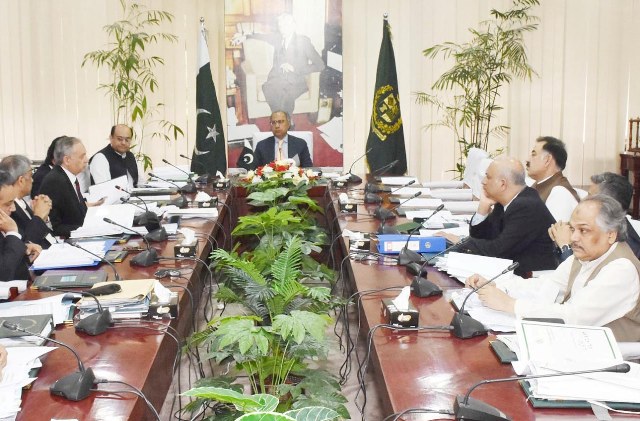–Committee says wheat situation will be monitored on a monthly basis so as to ensure its availability at reasonable prices
–Approves 45 acres land in Islamabad for directorate of ISI
ISLAMABAD: In order to control the prices of wheat and flour in the market and to ensure their availability at reasonable prices across the country throughout the year, the Economic Coordination Committee (ECC) has given a go-ahead to the private sector to import the commodity.
The ECC meeting, which was chaired by Adviser to Prime Minister on Finance and Revenue Dr Abdul Hafeez Shaikh, also decided not to restrict wheat import to any particular limit, stating that the situation would be monitored on a monthly basis to ensure the availability of wheat and flour in all parts of the country at reasonable prices.
“The provincial governments will be requested to announce their ‘Wheat Release Policy’ immediately. In addition, Punjab will have to release 900,000 tonnes of wheat to flour mills of the province during the next two months at its proposed release price in order to prevent the surge in the price of wheat/flour,” the committee stated.
Moreover, PASSCO was directed to assess the immediate requirement of Khyber Pakhtunkhwa and Balochistan and ensure the supply of wheat as per agreed targets. It was also asked to facilitate the private wheat importers and make arrangements between importers and KP/Balochistan government so as to calculate the impact of import subsidy.
“If there is no import by the private sector, then the government should import the commodity itself. It should also monitor and improve the wheat supply mechanism at shortage points, besides looking at other market imperfections connected to supply and demand of wheat/flour.”
Meanwhile, the ECC considered and approved five proposals moved by the Interior Division, including a technical supplementary grant (TSG) of Rs2.5 billion to clear accrued verified liabilities of Punjab Mass Transit Authority as federal share on account of operation of the Pakistan Metro Bus System; two separate TSGs of Rs200 million and Rs36.400 million for ICT Police to clear outstanding liabilities of Shuhada families; and two separate TSGs of Rs105.621 million and Rs60.581 million for ICT Police to clear outstanding liabilities during FY19-20.
The ECC also approved a proposal by the Finance Division for a TSG of Rs1.3 billion to meet critical demands related to medical stores and utilities for the Pakistan Navy.
On a proposal by the Defence Division, the ECC allowed the Capital Development Authority to collect charges against allotment of 45 acres land in Jagiot Farm in Islamabad to the Directorate General of the Inter-Service Intelligence (ISI) as per Rs2,250 per square yard rate with the total implication of Rs490.05 million as already approved by the former prime minister in May 2018. The ECC approved a TSG amounting to Rs490.05 million for the purpose.
On a proposal by the Industries and Production Division, the ECC approved a reduction in duties and taxes for a period of three months to ensure uninterrupted supply of oxygen gas and cylinders in the country for medical purposes. The ECC also directed the Ministry of National Health Services Regulations and Coordination and Ministry of Interior to clear all the outstanding dues payable to oxygen manufacturing companies as per the legal provisions of contracts.
The committee also considered and approved a proposal by the Finance Division for a new lending policy to the provincial governments for their ‘Ways and Means’ requirements and for the signing of agreements by Finance Division and the State Bank of Pakistan to implement the new lending policy.
Under the new policy, the existing ‘Ways and Means’ limit for Punjab has been changed from Rs37 billion to Rs77 billion; Sindh Rs39 billion (from Rs15 billion), Khyber Pakhtunkhwa Rs27 billion (from Rs10.1 billion) and Balochistan Rs17 billion (from Rs 7.1 billion).
























